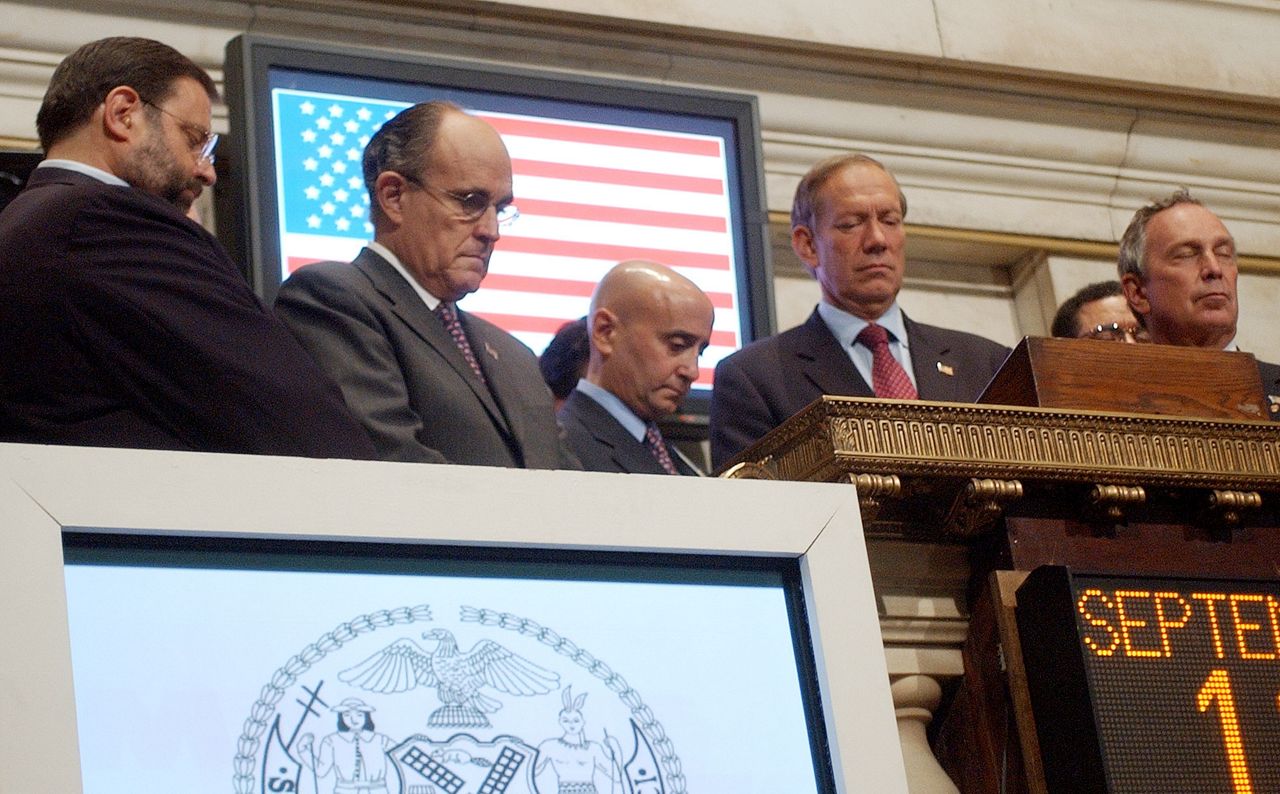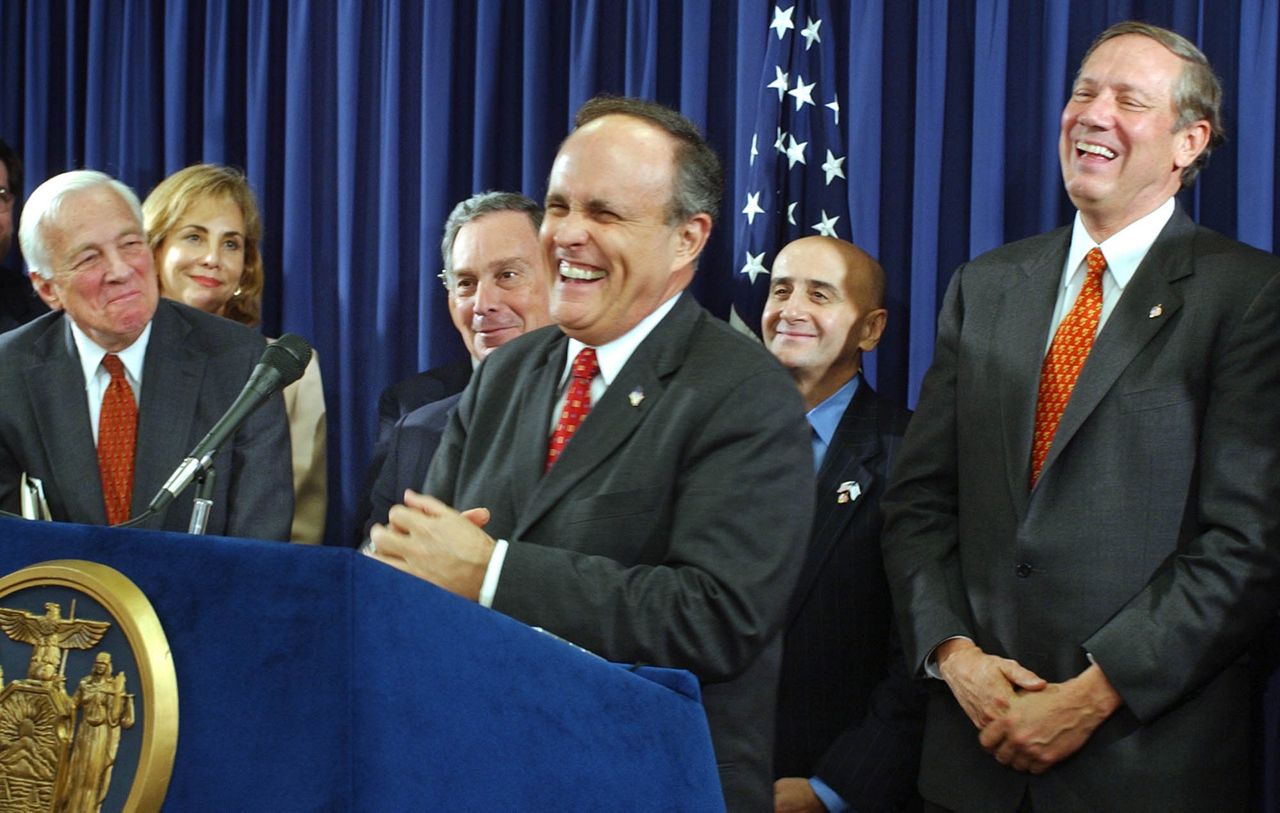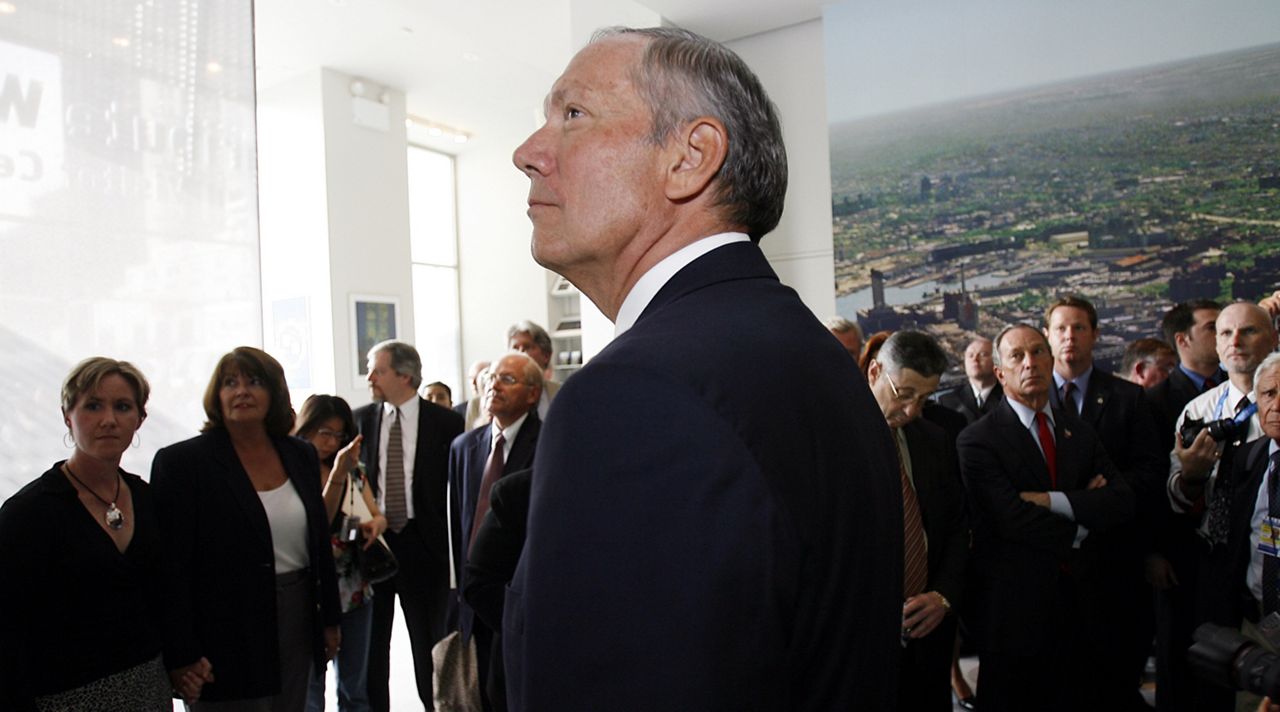Nearly twenty years ago, New York faced the crisis of the September 11 attacks. It took leadership from city, state and federal leaders to help New York see the crisis through. We spoke with former Gov. George Pataki about what lessons leaders today can draw from that experience in 2001.
Pataki has a new book out today, Beyond The Great Divide: How A Nation Became A Neighborhood, on the experience of dealing with the aftermath of the attacks.
The coronavirus pandemic has killed more than 10,000 New Yorkers and sent the state's economy into a tailspin -- a crisis that comes two decades after New York reeled from the September 11 terrorist attacks.
Pataki had to work with then-Mayor Rudy Giuliani and the two had an at-times contentious relationship.
Gov. Andrew Cuomo, too, has clashed with Mayor Bill de Blasio during the pandemic most recently over when to re-open schools. President Donald Trump asserts only he has the authority to re-open the state's economy.
Pataki, however, said egos need to be set aside during an emergency in order to manage it as well as the aftermath.
Here's a transcript of that interview, with some light editing for clarity.

Spectrum News: What was necessary and what was needed to be done in order to instill confidence in people that New York was re-opening for business?
George Pataki: I think that's often the forgotten question. People ask about how we respond to the loss of life, which obviously was the most important thing, how do we rebuild lower Manhattan, the Freedom Tower and the memorial. But what people don't ask is the important question of how do we get New York to come back. We were facing an economic catastrophe. The hotels were empty, the streets were empty. It was a lot like today, there was just no one there when you went around the city. And because it was a local attack, it was an attack on America, but localized in Manhattan, the mantra was you had to get out of there. Get out of the city, move to the suburbs, don't have a world financial center with all these power houses in one area.
So what we had to do were a number of things. We created a very strong package of incentives for businesses focused on Ground Zero, but expanding out across all of the lower half of Manhattan. The second was we had to give people confidence in public safety and having the State Police, having the National Guard, having troopers at the train stations -- help reassure. And we had to rebuild the infrastructure. There was no water, there was no power, there were no lights in all of lower Manhattan. We had to set a quick timetable to bring those essential things.
There's no one thing to restore public confidence and get people to come back to a place like New York City or believe in tommorrow. We needed to do everything together and were able to get through it.

SN: What was the challenge when it came to what the federal government, what the city of New York wanted and balance the needs of the state?
GP: I got a call the afternoon of Sept. 11 from Mayor Giuliani who had gotten out of the rubble and he said he was setting up an emergency command center in lower Manhattan with all his team. I thought for a minute and said, "I'll be right down."
I went with my entire emergency response team to the same building and the same room. On one said there was every single critical city official and the mayor was there and on the other side was every single critical state official and I were there. So we never had any doubt of whether the state was supposed to do this or the city was supposed to do this.
And later on, FEMA came in, they went into the same room at the end of the table. We weren't pointing fingers, we weren't in doubt as to whose responsibility a particular thing was. I tell that story in the book I've just written Beyond The Great Divide as probably the single most important decision I made. We didn't have dueling press conference. That never happened, it should not happen in a crisis.
SN: That's a lot of big personalities to manage. Did it seem like people were setting their egos aside at that time?
GP: Absolutely. That's the way it should be. Americans and New Yorkers are great people. When they're challenged and inspired they can rise to great heights and put aside petty personality differences or political interests. Yes, in that room we had a lot of egos, we had a lot of political personalities. It didn't matter. It was about doing the right thing to get us through a crisis. I'm proud of how it was set up.

SN: What was the challenge letting people know a corner will be turned and things will get better?
Pataki here tells the story of successfully working with American Express to stay in Manhattan after the company expressed security concerns, and how he offered law enforcement resources to do so in order to prevent the company from leaving and creating a cascade of corporate flight from the city.
GP: It is constant communication. I was constantly on the phone talking to business leaders, union leaders, hospitality industry leaders and we were putting together incentive packages and programs to help them on day one.
On the morning of September 12 in the lobby of where my office was we had tables set up for emergency assistance for small businesses and individuals. They worked all night to get that up and running. It was important that businesses and organizations and industries saw an aggressive effort and understanding of their problems that we had to get back to normal.
We created an incentive program, we got federal funding that we used to get people to stay or re-locate in lower Manhattan. It was a struggle. It was a brutal fight. I look at it now with the restaurant workers and the hotel workers and the theater workers who are unemployed. We had to put together health care programs for them and also say to global companies to stay here.

SN:It seems like the key to leadership during a crisis and a disaster is communication and responsiveness. Is that fair to say?
GP: Communication, responsiveness and focus. If you start thinking about your political agenda, or someone else's political agenda and you lose focus, then you're not going to have that ability to communicate and solve problems. On many, many levels it was an enormous challenge as it is today. I would just hope we would see communication and cooperation from the city, state and federal government and not this constant finger pointing. One says one thing, the other says no. That's not a way to get through a crisis. You might not like each other. But you are leaders in a time of an emergency that is costing the lives of New Yorkers. Come together, put aside your personalities and do what's right.



